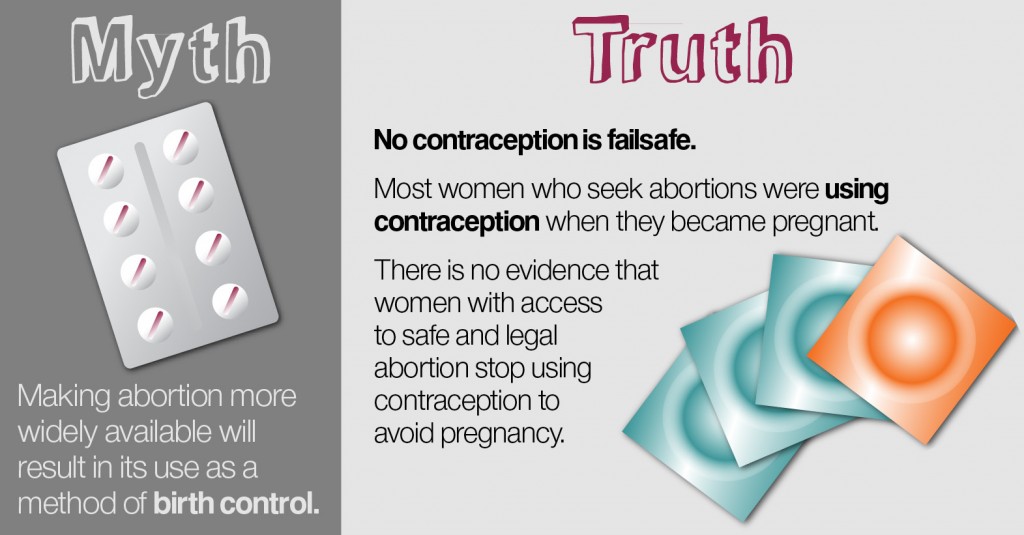Welcome to Day 4 of ‘8 Days-8 Reasons to Repeal the 8th’ where each day running to International Women’s Day, Abortion Rights Campaign we will be busting 1 common myth about abortion in Ireland. So check back here for tomorrow’s myth and tweet your own at us @freesafelegal and using #RepealThe8th
In partnership with Re(al)-Productive Health, we bring you:
Myth #4 Making Abortion more widely available will result in its use as a method of Contraception/Birth Control.
But the truth is much simpler:
Truth #4: There is no credible evidence that if abortion was more accessible that sexually active people would use abortion as a method of birth control.
Whiff of holier-than-thou misogyny from this one? We think so too.
First of all, abortion, by definition, can’t be used as a method of contraception: abortion occurs after conception.
Semantics aside, in the absence of any credible supporting evidence, there’s nothing to suggest that if abortion access is improved, sexually active people will suddenly ditch hormonal and/or barrier contraceptives in favour of abortion as a primary method of birth control (such as abortion can even be considered a method of birth control).
For one, abortion is, compared to contraception, potentially a far more troublesome and invasive way to go about not having a child. In many countries, even those in which abortion is legal, abortion services can also be difficult to access and/or expensive. Of course, the Abortion Rights Campaign advocates the availability of free, safe, legal abortion. The point remains, though, that the privacy and convenience alone of contraception make this myth more than a shade counter-intuitive.
And the notion that improved access to abortion will reduce the use of contraception is a myth. A recent Australian study found that the majority of women (in South Australia) seeking an abortion were pregnant despite contraceptive use and that the vast majority of the remaining women still hadn’t intended to become pregnant.
Thing is, no method of contraception is 100% reliable, and contraception may not always be used with flawless effectiveness and regularity. Furthermore, in Ireland emergency contraception (EC) can often prove prohibitively inaccessible and expensive.
Those accessing EC in Ireland also often come up against condescension and negative judgement. A study conducted by Re(al)-Productive Health shows that 17% of survey respondents had paid more than €35 for EC, with just 11% having paid less than €15. 23% of respondents identified the consultation process as negative; 28% felt that the pharmacist involved displayed negative judgement towards them, with terms such as ‘patronising’, ’embarrassing’, ‘awkward’, ‘unnecessary’ and the statement ‘I felt judged’ used by some participants.1 More worryingly, under Principle One of the Pharmaceutical Society of Ireland’s Code of Conduct for pharmacists, pharmacists may refuse to dispense EC if it contradicts their ‘personal moral standards’.
As the Australian study shows, women who don’t wish to become pregnant may still do so because of, for example, rape or an abusive partner who controls contraceptive use or sabotages contraceptives; substandard sexual health education or access to information; falsely believing oneself to be infertile; cultural bans; human error, etc.
An unplanned pregnancy is a potentially distressing situation for any woman. The presumption that women don’t think long and hard about how to prevent, deal with and potentially terminate a pregnancy is not borne out in any research, anecdotal or scientific. It’s a presumption founded on a distrust of women to have the capacity to make informed and responsible choices about their lives and health. When women have full reproductive choices, however, they do what makes economic, personal, moral and social sense for their own lives.
It’s only in countries that have restricted or no access to contraception that abortion has been shown to become a primary method of controlling one’s reproduction. Romania in the late 1980s, for example, after 25 years of bans on contraceptives and abortion services enacted under Nicolae Ceauşescu’s Government, still had the highest abortion rate in Europe.
Abortion as a primary method of birth control? Technically impossible, statistically improbable, frankly insulting.
1 ‘Accessing emergency contraception ‘behind the counter’ in pharmacies in Ireland’ (forthcoming).


